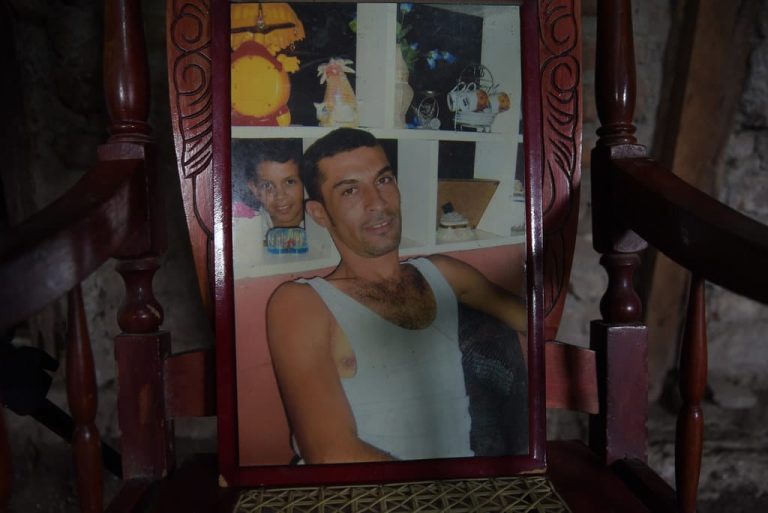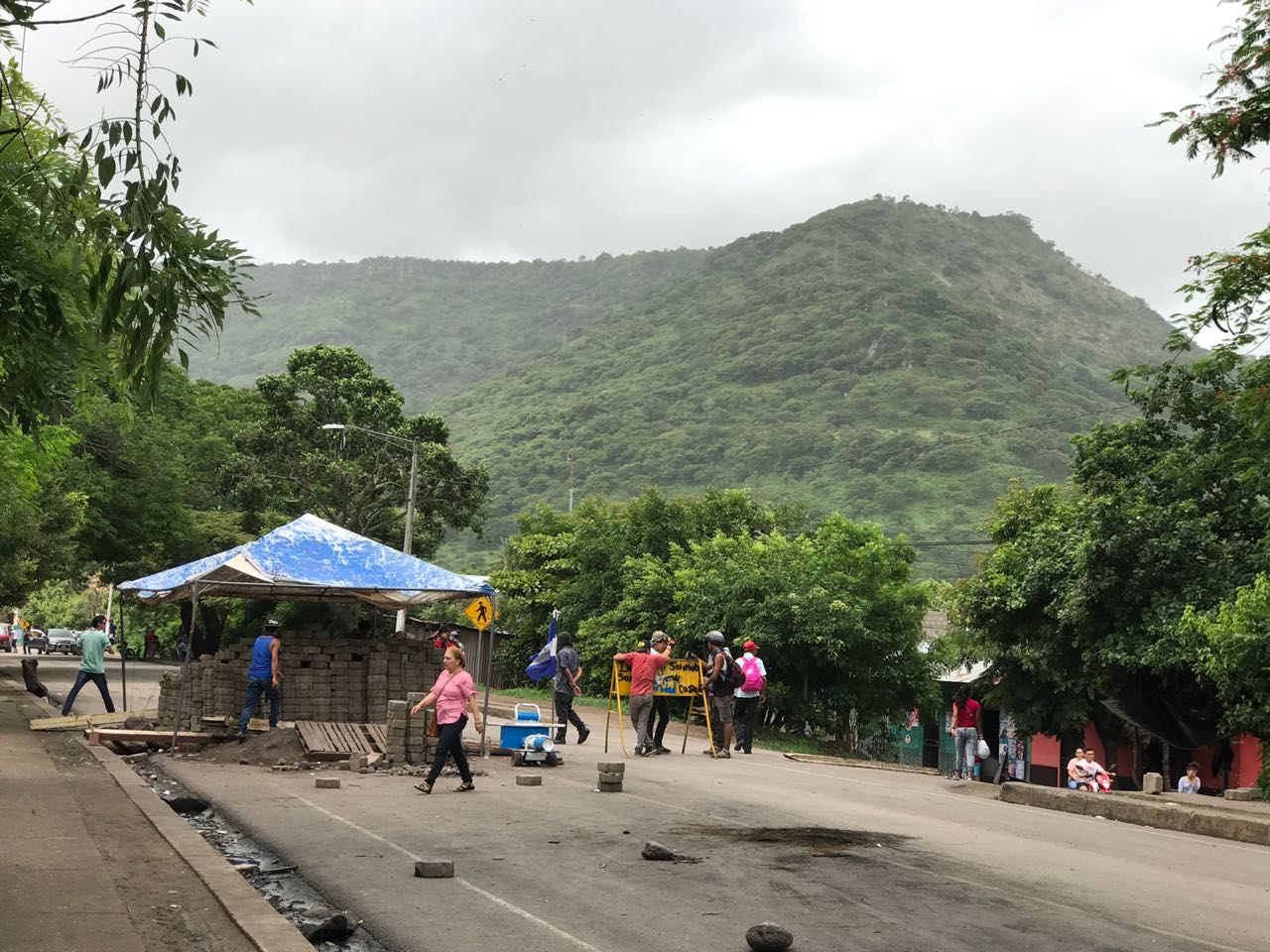2 de diciembre 2020

The Return of the Military

PUBLICIDAD 1M
PUBLICIDAD 4D
PUBLICIDAD 5D
Family members of slain Nicaraguan Abner Rugama and residents of La Trinidad are outraged by the pardoning of his killer

Jose Luis Rugama Rizo. Photo: Nayira Valenzuela / Confidencial
It was a coincidence of fate. First, there were three postponements of the trial, and an unexpected change of judge. Then, on November 19th, Sandinista fanatic Abner Onell Pineda Castellon was set free. By chance, it was exactly four months from the day he shot and killed Jorge Luis Rugama Rizo. Relatives and advocates of the victim call the judge’s decision “a mockery” and a “legal aberration”.
Jorge Rugama was murdered on July 19th, for shouting “Long live a free Nicaragua!” at a passing caravan of Ortega supporters. Pineda was on that caravan. The vehicle parade was crisscrossing the streets of La Trinidad, in Esteli department, celebrating the 41th anniversary of the Sandinista Revolution.
Hearing Rugama’s defiant yell, Pineda got down from the truck, took out a gun and shot him in the neck. The events took place in full view of the population.
Four months later, judge Erick Laguna declared Pineda guilty of manslaughter and sentenced him to a year in prison. Simultaneously, he ordered the sentence to be immediately suspended and the prisoner to be “immediately” set free.
“To me, [the legal sentence] is a mockery. If the government says there are laws, well, they should be seen. The laws are only visible for those in the opposition. For the others, and his [Ortega’s] people, the laws don’t apply. The law has to be the same for all,” stated Luisa Rizo Laguna, the victim’s mother.
“I wanted justice, and that’s what I’m asking for. Because it wasn’t an animal he killed, it was a human being. I can see that justice in Nicaragua is dirty. Here, there’s justice only for the fools, there’s no justice for them [Sandinistas]. Look how many protestors they have in jail, and they haven’t been able to get them out. Even with people who are really sick,” the mother added.
Eber Acevedo of the Permanent Human Rights Commission (CPDH) served as a complaining attorney for the case. He says that the sentence “is one of the most aberrant in the history of Nicaraguan trials. The judge just takes whatever pretext he wants in order to pardon Mr. Abner Pineda.”
Judge Laguna alleged that Abner Pineda was suffering from psychological trauma stemming from the April 2018 “failed coup attempt”. The term has been used by the Ortega regime to justify their repression of the massive citizen protests that year. The judge claimed that Abner Pineda had been harassed on many occasions because of his party sympathies.
Acebedo spoke during an interview broadcast on the weekly internet news program Esta Semana, He explained that Pineda’s defense team had spoken of “threats” the accused received during the 2018 protests. The judge, however, “went further and established the ‘coup attempt’. This is in concordance with the discourse from the Executive Office.”
The court’s actions “indicate the total subordination of this judge”, Acevedo summarized. It also highlighted “the zero independence of the Judicial Branch in this country.”
Luisa Rizo wondered aloud about the claim of trauma. How come after two years Pineda hadn’t been cured. “Why wasn’t he seen by a doctor before? It wasn’t until he made this horrible mess that they started to look for doctors to check him. That’s pure vulgarity.”
She used herself as an example. “I lost my husband, I lost a son in the military service, and now with Jorge, I’ve lost three. Not one is left. I haven’t come out traumatized, and it’s enough so I should be.”
The patriarch of the family, Reynaldo Rugama, was killed after the Sandinista Revolution triumphed in 1979. Her son, Sergio Rugama, died in 1987 at the age of nineteen, during his compulsory military service. “They all died in the month of July,” noted Luisa Rizo.
Young people and other residents of La Trinidad refuted the allegations of psychological trauma. They were there at the barricade that was erected in the municipality between May and July of 2018.
“To say that sympathizers of the Sandinista Front feel harassed and are traumatized is a lie, a fallacy. No one has attacked any Sandinista sympathizer, it’s the other way around. In the department of Esteli, they [Sandinista sympathizers] attack, watch over and lay siege to the people who oppose them.” These were the observations of Bryan Quiroz, a former political prisoner.
“Elena”, a participant in the roadblock, pointed out that the self-organized youth made an agreement. “That we shouldn’t offend, harm or besiege any government sympathizer. At the end of the day, we’re the same people, so we couldn’t do that.”
The young woman assured that the opposition members who were at the roadblock “at no time” besieged or offended Abner Pineda. “What’s more, he went by the barricade many times and we just greeted him,” she declared.
The barricade erected at La Trinidad never completely closed off traffic. It was opened three times a day for vehicles to pass: at 6 am, at noon, and at 6 pm. At night, the road was closed to traffic.

The road block that was in La Trinidad. Photo Wilfredo Miranda / Archivo Confidencial
The roadblock was forcibly dismantled on July 3, 2018, during the bloody Operation Clean-up the government ordered. That operation left dozens dead and hundreds wounded in several of the country’s departments. In La Trinidad, however, there were no fatal incidents.
Arnoldo Mairena, an assistant to the mayor in La Trinidad, recalled the events of that period. “The kids withdrew to maintain peace in the town, and there wasn’t any lamentable confrontations or victims.”
He speculated that maybe the young people’s peaceful withdrawal “annoyed” the police and paramilitary who came to dismantle the roadblock. “You’ve never seen so many armed cowards facing a disarmed people. What were the kids going to face them with, when all they had were stones and homemade mortars? The other side had Dragunov and AKA rifles, they had super heavy arms.”
“Elena” recalled how the paramilitary “guarded or patrolled” the homes of the principal members of the April 19th opposition movement. The vigilance began after the barricade was torn down, and continued for the next three months. “They spent all day and all night in front of their houses. Some banged on the walls to see if they were there. Many of us had to leave and go to safe houses,” she commented.
The young woman currently lives in Nicaragua, but outside of La Trinidad. However, the majority of her companions have gone into exile in Costa Rica, Panama, Spain and the US. “To date, they haven’t been able to return. They haven’t seen their families or returned to their country going on three years.”
Bryan Quiroz spent almost eight months in the La Modelo men’s prison. He’s been detained a few times more, and added that for two years he’s been a “nomad”. “I’m not living in Esteli because I’m really afraid of those people’s fanaticism. I don’t visit my family. I stopped studying because I don’t want to put myself out there as an easy target. I can’t work. I don’t have any way to get a bank account or credit. I’m practically living a civic death,” he told us.
Luis Rugama’s murder has filled the residents of La Trinidad with impotent frustration. This municipality has a population of some 35,000, and has traditionally elected municipal leaders from the Liberal Constitutionalist Party.
“There was indignation, irritation, a lot of bad feelings. Feelings of impotence and an inability to act in the face of such things,” affirmed Mairena. Mairena works as assistant to the town mayor, Bismarck Rayo of the Liberal party.
The judge’s action to free the killer hasn’t gone unnoticed by those in town. The same judge, Erick Laguna, is known to have imposed sentences of just three years in jail for the 2011 murder of a family. On that occasion, fanatical Ortega supporters killed an opposition family in the indigenous community of El Carrizo in Madriz department.
“The judge didn’t pay any attention to what we were saying. He was there [during the interrogation] with a cellphone. Our part was quick – a few questions and out. He spent a little more time with their [the defense] witnesses.” These were the declarations of Jose Francisco Vallecillo, a witness for the prosecution.
No one in La Trinidad has seen Abner Pineda since his release. They presume he’ll establish residence in Esteli where he worked in the post office.
Jorge Luis Rugama left two children. A daughter, 24, lives in Costa Rica. A son, 22, is now the only one that accompanies his grandmother, Luisa Rizo.
“They follow him [Rugama’s son]. We don’t know why. What could they be following him for? It should be us following them, because we’re the losers, not them,” lamented the victim’s mother.
Archivado como:
PUBLICIDAD 3M
Confidencial es un diario digital nicaragüense, de formato multimedia, fundado por Carlos F. Chamorro en junio de 1996.
PUBLICIDAD 3D